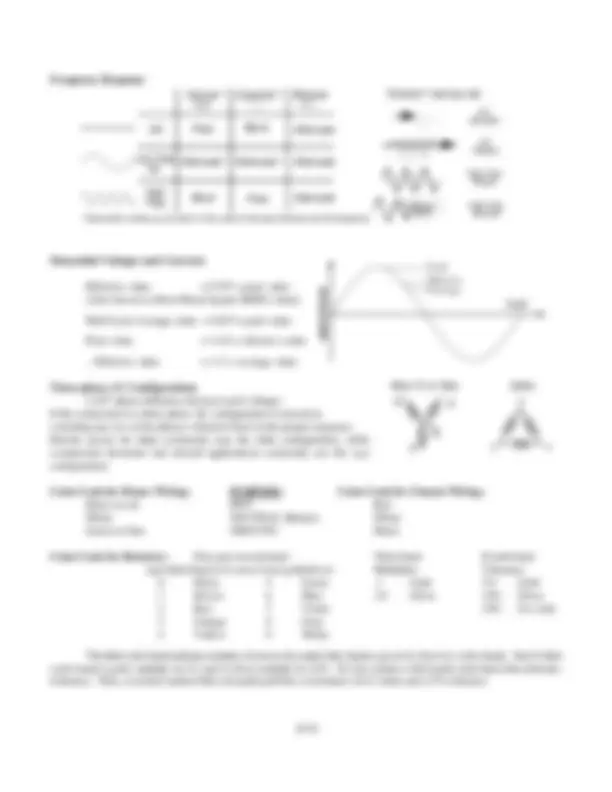



Study with the several resources on Docsity

Earn points by helping other students or get them with a premium plan


Prepare for your exams
Study with the several resources on Docsity

Earn points to download
Earn points by helping other students or get them with a premium plan
Community
Ask the community for help and clear up your study doubts
Discover the best universities in your country according to Docsity users
Free resources
Download our free guides on studying techniques, anxiety management strategies, and thesis advice from Docsity tutors
Quick and useful cheat sheet with all the main Electronic Formulas
Typology: Cheat Sheet
1 / 2

This page cannot be seen from the preview
Don't miss anything!


2 R
I cos 1
cos 1
P ' I^2 Z cos 1 ' IE cos 1 ' E^
(^2) cos 1 Z
pf ' Active^ power^ ( in^ watts ) Apparent power ( in volt & amps )
pf ' R Z
Rtotal ' R 1 % R 2 ' R 3 % ...
Rt '
Rtotal ' 1 1 R 1
f ' 1 2 B LC
, or f ' 159.^2 ( LC
L ' 1 4 B^2 f^2 C
, or L ' 25,330( f^2 C
C ' 1 4 B^2 f^2 L
, or C ' 25,330( f^2 L
( for D & C circuit ) G^ '^
( for A & C circuit )
2 B f C
2 B f XC
XL ' 2 B fL (^) L '
2 B f
Z ' R^2 %( XL & XC )^2 ( for series circuit ) Z^ '^
( for R and X in parallel )
or
2-7.
Ohm's Law Formulas for D-C Circuits.
Ohm's Law Formulas for A-C Circuits and Power Factor.
In the above formulas 1 is the angle of lead or lag between current and voltage and cos 1 = P/EI = power factor or pf.
Note: Active power is the "resistive" power and equals the equivalent heating effect on water.
Voltage/Current Phase Rule of Thumb Remember "ELI the ICE man"
ELI: Voltage (E) comes before (leads) current (I) in an inductor (L) ICE: Current (I) comes before (leads) Voltage (E) in a capacitor (C)
Resistors in Series
Two Resistors in Parallel Resistors in Parallel, General Formula
Resonant Frequency Formulas *Where in the second formula f is in kHz and L and C are in microunits.
Conductance
Reactance Formulas
Impedance Formulas
Q or Figure of Merit
DC Blocked
DC Passes
High Freq Blocked
High Freq Passes
DC
Low Freq AC
High Freq
Inductor * Capacitor * Resister
Pass Block^ Attenuate
Attenuate * Attenuate * Attenuate
Block Pass Attenuate
* Attenuation varies as a function of the value of the each device and the frequency
"Cartoon" memory aid
Peak Effective Average TIME
Wye (Y) or Star Delta
2-7.
Frequency Response
Sinusoidal Voltages and Currents
Effective value = 0.707 x peak value [Also known as Root-Mean Square (RMS) value]
Half Cycle Average value = 0.637 x peak value
Peak value = 1.414 x effective value
à Effective value = 1.11 x average value
Three-phase AC Configurations (120E phase difference between each voltage) If the connection to a three phase AC configuration is miswired, switching any two of the phases will put it back in the proper sequence. Electric power for ships commonly uses the delta configuration, while commercial electronic and aircraft applications commonly use the wye configuration.
Color Code for House Wiring: PURPOSE: Color Code for Chassis Wiring: Black or red HOT Red White NEUTRAL (Return) White Green or bare GROUND Black
Color Code for Resistors: First and second band: Third band Fourth band (and third band # of zeros if not gold/silver) Multiplier Tolerance 0 Black 5 Green .1 Gold 5% Gold 1 Brown 6 Blue .01 Silver 10% Silver 2 Red 7 Violet 20% No color 3 Orange 8 Gray 4 Yellow 9 White
The third color band indicates number of zeros to be added after figures given by first two color bands. But if third color band is gold, multiply by 0.1 and if silver multiply by 0.01. Do not confuse with fourth color-band that indicates tolerance. Thus, a resistor marked blue-red-gold-gold has a resistance of 6.2 ohms and a 5% tolerance.